Share
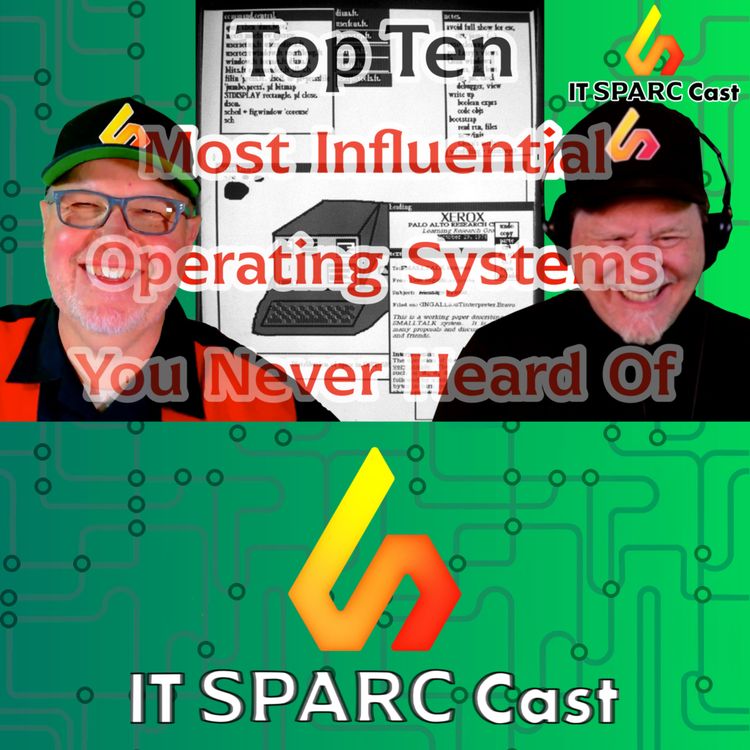
IT SPARC Cast
Top 10 Most Influential Operating Systems You’ve Never Heard Of
Not all legendary tech comes with name recognition. In this episode of IT SPARC Cast - Top Ten, John & Lou count down the Top Ten Most Influential Operating Systems You’ve Never Heard Of. While these operating systems that didn’t dominate the headlines, they did quietly change the world. These OSes shaped modern computing, from time-sharing and GUIs to virtualization and microkernels. You may not know their names, but their fingerprints are all over your daily tech.
Whether you’re a sysadmin, historian, or just a curious nerd, this countdown of the most influential unsung operating systems will surprise and educate. Let’s roll back the clock and celebrate the OS innovations that powered everything from IBM mainframes to Amiga multimedia.
⸻
⏱️ Timestamps & Segment Titles:
00:00 – Intro
Welcome to the IT SPARC Cast Top Ten – what makes an obscure OS influential?
01:50 – #10 – CTSS (Compatible Time-Sharing System) – 1961
The first practical time-sharing OS that laid the groundwork for interactive computing.
05:06 – #9 – Atlas Supervisor (Manchester Atlas OS) – 1962
The forgotten pioneer of virtual memory and true multiprogramming.
07:11 – #8 – IBM OS/360 – 1966
The OS that defined enterprise computing and invented virtualization.
11:53 – #7 – Multics (Multiplexed Information and Computing Service) – 1967
The security-hardened ancestor of Unix and modern system design.
14:28 – #6 – TOPS-10 (DEC PDP-10 OS) – 1970
The platform that built ARPANET and inspired early open-source culture.
17:02 – #5 – Xerox Alto Executive – 1973
The GUI trailblazer that inspired the Macintosh and modern desktop metaphors.
20:23 – #4 – CP/M (Control Program for Microcomputers) – 1974
The OS that created the first cross-platform software ecosystem.
23:03 – #3 – VMS (Virtual Memory System) – 1978
Enterprise-grade reliability and the direct ancestor of Windows NT.
26:10 – #2 – AmigaOS – 1985
The first true multimedia multitasking OS for the home computer.
31:30 – #1 – MINIX – 1987
The educational OS that launched a revolution—by inspiring Linux.
35:45 – Wrap Up
Let us know what we missed! What’s your favorite obscure but powerful OS?
More episodes
View all episodes
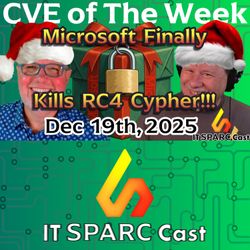
17. Microsoft Disables RC4: Why This Legacy Cipher Had to Die
09:01||Season 2, Ep. 17In this episode of IT SPARC Cast – CVE of the Week, John Barger and Lou Schmidt break down a long-overdue security move from Microsoft: disabling the RC4 cipher by default across Windows authentication infrastructure. After more than two decades of known cryptographic weaknesses, RC4 is finally being deprecated in favor of modern encryption standards like AES.The discussion covers why RC4 persisted for so long, how legacy Active Directory and Kerberos environments kept it alive, and why attackers have continued to exploit it through techniques like Kerberoasting. The hosts also highlight the new logging, auditing, and PowerShell tools Microsoft released to help enterprises identify and eliminate lingering RC4 dependencies—without breaking production systems.⸻📋 Show Notes🔐 Main Topic: Microsoft Disables RC4 by Default • Microsoft is removing RC4 (Rivest Cipher 4) as a default cipher in Windows authentication after more than 25 years. • RC4 has been known to be cryptographically broken for decades and has been actively exploited in real-world attacks. • The change impacts Kerberos authentication across Windows Server 2008 and later. • RC4 will still function only if explicitly re-enabled—which is strongly discouraged.⚠️ Why RC4 Is Dangerous • RC4 has been abused in Kerberoasting attacks against Active Directory environments. • Weak encryption allows attackers to extract service account credentials offline. • Keeping RC4 enabled significantly increases the blast radius of a compromised domain.🛠️ What Microsoft Did Right This Time • Added enhanced Kerberos logging (Event IDs 4768 and 4769) to identify RC4 usage. • Released PowerShell scripts to audit domain controllers for RC4 dependencies. • Published clear migration guidance to move environments to AES-SHA1 and stronger encryption. • Provided visibility before enforcing the change, helping admins avoid outages.🎧 Listener Feedback Highlight • A YouTube listener praised the CVE of the Week format as being highly valuable from an ops and security standpoint. • Strong validation that actionable vulnerability analysis resonates with enterprise IT teams.⭐ Community Call-Out: Abdullah’s React Audit ToolA special shout-out to Abdullah ( https://x.com/ozkayabd ) who responded on X after a previous React CVE episode and shared an open-source tool to help teams audit their environments:👉 React Audit Scannerhttp://rsc-auditor.vercel.appThis tool allows teams to quickly check whether they may be impacted by recent React vulnerabilities. As always, review and validate any third-party tool before using it in production.⸻🔚 Wrap Up & Social LinksIT SPARC Cast@ITSPARCCast on Xhttps://www.linkedin.com/company/sparc-sales/ on LinkedInJohn Barger@john_Video on Xhttps://www.linkedin.com/in/johnbarger/ on LinkedInLou Schmidt@loudoggeek on Xhttps://www.linkedin.com/in/louis-schmidt-b102446/ on LinkedIn
17. AI Layoffs, Data Centers in Space, Jet Engines for Power, and Google’s MCP Play
23:18||Season 2, Ep. 17In this episode of IT SPARC Cast – News Bytes, John and Lou tackle one of the most emotionally charged weeks in enterprise IT. Google CEO Sundar Pichai openly acknowledges that AI-driven layoffs will cause real pain before progress—a statement that sparks a candid Hot Take on disruption, job loss, and opportunity.From there, the show dives deep into the mounting backlash against U.S. data centers, with over 200 environmental groups demanding a halt to new builds—ironically accelerating plans for orbital data centers. The conversation then turns optimistic as the inventor of the Super Soaker unveils a breakthrough technology that converts waste heat directly into electricity, potentially reshaping geothermal and data center power economics.Finally, the guys explore Boom Supersonic’s unexpected pivot—using jet engines as grid-scale power generators for data centers—and Google’s launch of managed MCP servers that allow AI agents to plug directly into core Google services with minimal integration effort.⸻⏱️ Show Notes00:00 – IntroThis week: Google admits AI pain is coming, environmentalists push data centers toward orbit, waste heat becomes power, and AI agents get a universal plug.⸻HOT TAKE00:55 – Google CEO on AI Layoffs: “We’re All Going to Have to Suffer Through It” • Sundar Pichai acknowledges widespread layoffs and economic strain tied to AI adoption. • John and Lou discuss why AI-driven efficiency gains are being used as justification for premature workforce cuts. • Key argument: AI doesn’t replace people—it amplifies small teams and enables entrepreneurship.https://www.msn.com/en-us/money/companies/google-ceo-says-we-re-all-going-to-have-to-suffer-through-it-as-ai-puts-society-through-the-woodchipper/ar-AA1S5Pzx ⸻NEWS BYTES06:11 – More Than 200 Environmental Groups Demand Halt to New U.S. Data Centers • Greenpeace and others cite water usage, power demand, and CO₂ emissions. • ~$64 billion in data center projects already delayed or halted. • Lou explains why this pressure is accelerating interest in orbital data centers—one FCC license vs. hundreds of local permits.https://www.theguardian.com/us-news/2025/dec/08/us-data-centers ⸻10:26 – Super Soaker Inventor Wants to Turn Waste Heat into Electricity • Lonnie Johnson (inventor of the Super Soaker) unveils the Johnson Thermal Electrochemical Converter (JTEC). • Works with small temperature differentials—no turbines, no moving parts. • Could dramatically change how data centers source supplemental power.https://www.ajc.com/business/2025/11/earth-needs-more-energy-atlantas-super-soaker-creator-may-have-a-solution/ ⸻13:08 – Boom Supersonic Uses Jet Engines to Power Data Centers • Boom Supersonic repurposes its jet engine designs into natural gas turbines for data centers. • Each turbine outputs ~42 MW; initial orders exceed 1.2 GW and are rapidly increasing. • First deliveries expected in 2027; turbine factory opening next year. • John and Lou connect this to job creation across manufacturing, operations, and IT management.https://techcrunch.com/2025/12/10/google-is-going-all-in-on-mcp-servers-agent-ready-by-design/ ⸻16:44 – Google Launches Managed MCP Servers for AI Agents • Google introduces managed Model Context Protocol (MCP) servers on GCP. • MCP creates a universal “language” for AI agents to interact with tools and services. • Reduces API complexity—ask questions, get results, take action. • Free during public preview for enterprise customers. • Lou calls this a major step toward AI-native enterprise workflows.https://techcrunch.com/2025/12/10/google-is-going-all-in-on-mcp-servers-agent-ready-by-design/ ⸻Wrap Up20:38 – Mail Bag & Wrap Up • Listener feedback highlights interest in portable and containerized data centers.IT SPARC Cast@ITSPARCCast on Xhttps://www.linkedin.com/company/sparc-sales/ on LinkedInJohn Barger@john_Video on Xhttps://www.linkedin.com/in/johnbarger/ on LinkedInLou Schmidt@loudoggeek on Xhttps://www.linkedin.com/in/louis-schmidt-b102446/ on LinkedIn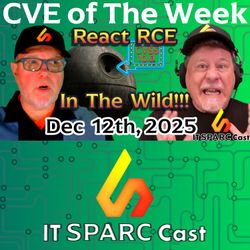
16. React Server Components Under Active Exploit: CVE-2025-55182 Goes Code Red
09:21||Season 2, Ep. 16This week on IT SPARC Cast – CVE of the Week, John Barger and Lou Schmidt break down a code-red security situation affecting a massive portion of the modern web. CVE-2025-55182 is a critical, actively exploited vulnerability in React Server Components (RSC) that enables unauthenticated remote code execution, even in applications that don’t explicitly use server functions.With an estimated 33–35% of cloud-based services running React, attackers are already leveraging automated tooling to deploy cryptominers, Linux backdoors, and persistent malware across vulnerable systems. If you run React, Next.js, or containerized web workloads, this episode outlines exactly why this exploit is so dangerous, how attackers are weaponizing it, and what you must do right now to mitigate risk—from emergency patching to Zero Trust and micro-segmentation strategies.⸻Show Notes🔴 CVE of the Week: CVE-2025-55182 (React Server Components RCE)In this episode, John and Lou sound the alarm on a critical vulnerability in React Server Components that has escalated from disclosure to active, automated exploitation in the wild.Key points covered: • CVE-2025-55182 allows unauthenticated remote code execution via unsafe serialization and deserialization in React Server Component endpoints • Vulnerable components include: • react-server-dom-webpack • react-server-dom-parcel • react-server-dom-turbopack • A related issue impacts Next.js App Router deployments, tracked separately as CVE-2025-66478 • Even applications that do not explicitly use server functions may still be exploitable if RSC support exists🚨 Active Exploitation ConfirmedLou shares real-time intelligence showing attackers using automated tooling dubbed “React-to-Shell”, delivering: • Cryptocurrency miners • Linux backdoors (PeerBlight) • Reverse proxy tooling (CowTunnel) • Go-based post-exploitation implants (ZinFoq)This is no longer theoretical—production systems are being compromised right now.🛡️ Immediate Mitigation GuidanceIf you run React or Next.js workloads: • Patch immediately to fixed versions • Disable or strictly isolate RSC server function endpoints if not required • Place RSC behind WAFs and strict network controls • Harden container and OS permissions • Implement payload anomaly detection • Move toward micro-segmentation and Zero Trust architectures to limit blast radiusJohn and Lou emphasize that patching alone is no longer enough in an era of AI-accelerated exploitation.⸻Wrap Up & Community FeedbackThe episode closes with listener feedback from LinkedIn discussing CXL memory pooling and how it is changing enterprise infrastructure economics—plus a recommendation to check out deep-dive demos from Serve The Home.As always, the team invites listener input on whether future episodes should focus on individual CVEs or broader security themes.⸻Follow & ConnectIT SPARC Cast@ITSPARCCast on Xhttps://www.linkedin.com/company/sparc-sales/John Barger@john_Video on Xhttps://www.linkedin.com/in/johnbarger/Lou Schmidt@loudoggeek on Xhttps://www.linkedin.com/in/louis-schmidt-b102446/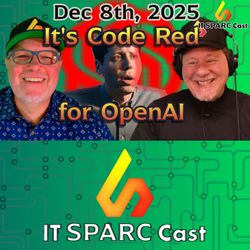
16. Apple’s AI Shakeup, India’s Surveillance App, OpenAI Code Red, and Multi-Cloud Peace Treaty
24:27||Season 2, Ep. 16In this episode of IT SPARC Cast – News Bytes, John and Lou cover a packed week in tech policy, AI disruption, and cloud infrastructure. Apple loses its AI chief as the company struggles to keep pace with rivals. India orders smartphone makers to preload a government surveillance app—then backpedals after Apple pushes back. Sam Altman declares a “Code Red” inside OpenAI as pressure mounts from Google, Anthropic, and the entire LLM ecosystem. And finally, Amazon and Google partner on a new high-speed multi-cloud interconnect—an unexpected alliance triggered in part by AWS’ recent outages.This episode blends politics, enterprise IT strategy, security concerns, and cloud architecture trends—delivered with classic SPARC Cast sarcasm.⏱️ Show Notes00:00 – IntroThis week: Apple says goodbye to its AI chief, India tests mandatory surveillance apps, OpenAI hits the panic button, and Amazon+Google become “friends with benefits.”NEWS BYTES00:46 – Apple AI Chief ExitsApple confirms that John Giannandrea, SVP of Machine Learning & AI Strategy, will step down in Spring 2026. • He was Apple’s “big hire from Google” and led AI initiatives for eight years. • His replacement: Amar Subramanya, reporting to Craig Federighi. • John & Lou discuss Apple’s AI struggles:– Apple Intelligence is “not what was promised”—delayed, underwhelming, and widely criticized.https://www.apple.com/newsroom/2025/12/john-giannandrea-to-retire-from-apple/ 06:43 – India Orders Smartphone Makers to Preload State-Owned Cyber Safety AppIndia announces a mandate requiring all new smartphones to include a government-built, undeletable cybersecurity app. • Goal: combat rising cybercrime, IMEI cloning, stolen-device fraud. • Users cannot remove or disable the app. • Lou and John highlight the risk.https://www.reuters.com/sustainability/boards-policy-regulation/india-orders-mobile-phones-preloaded-with-government-app-ensure-cyber-safety-2025-12-01/ 11:51 – Sam Altman Declares ‘Code Red’ for ChatGPTOpenAI CEO Sam Altman declares an internal “Code Red” tied to ChatGPT 5.2. • All nonessential projects—including the Pulse personalized assistant—paused. • Focus is entirely on improving 5.2 performance, reliability, and user experience. • Why now?– Gemini just jumped ahead in accuracy.– Claude leads in coding tasks.– Competition is moving at blistering speed.https://www.macrumors.com/2025/12/02/openai-delays-ad-plans/ 16:55 – Amazon and Google Launch Multicloud Service for Faster ConnectivityAmazon Web Services & Google Cloud jointly launch a multi-cloud private interconnect for rapid cross-cloud connectivity. • High-speed AWS ↔ Google Cloud links provisioned in minutes, not weeks. • Early adopter: Salesforce. • Why this matters:– After the major AWS East-1 outage, enterprises need cloud failover options fast.– This partnership essentially creates a safety net: if one cloud fails, the other can pick up load.https://www.reuters.com/business/retail-consumer/amazon-google-launch-multicloud-service-faster-connectivity-2025-12-01/ 20:32 – Mail Bag & Wrap UpSocial Links:IT SPARC Cast@ITSPARCCast on Xhttps://www.linkedin.com/company/sparc-sales/John Barger@john_Video on Xhttps://www.linkedin.com/in/johnbarger/Lou Schmidt@loudoggeek on Xhttps://www.linkedin.com/in/louis-schmidt-b102446/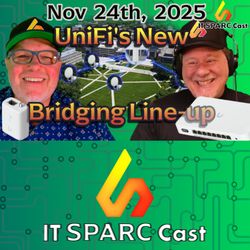
15. UniFi’s New Bridges, ChatGPT Group Chats, and… an IT Simulator Game?!
18:52||Season 2, Ep. 15In this episode of IT SPARC Cast – News Bytes, John and Lou break down Ubiquiti’s brand-new UniFi wireless bridging lineup, test drive the surprisingly powerful ChatGPT Group Chat feature, and review the newly released IT Specialist Simulator game—yes, it’s a real thing.Lou also shares his SuperComputing 25 highlights, covering quantum computing, CXL memory extension, and why this year’s show was one of the most energetic he’s ever seen. A packed week for enterprise IT, networking, AI tooling, and HPC.⏱️ Show Notes00:00 – IntroA preview of the week’s topics: ChatGPT enters the chat, Pixel Team Red makes IT into a game, and UniFi pushes wireless bridging further.NEWS BYTES01:21 – All-New UniFi BridgingUbiquiti announces an expanded lineup of UniFi bridging hardware, offering new flexibility for building-to-building links and hard-to-cable environments. Key highlights: • Building Bridge Single Unit – no more buying pairs; units can now be paired or re-paired on demand. • Device Bridge IoT – tiny 2.4 GHz client bridge for connecting wired devices where Ethernet isn’t available. • Device Bridge Switch – 2.5GbE PoE switch + Wi-Fi 7 / 6 GHz bridging for high-throughput deployment without new cabling. • Ideal for renters, campuses, remote buildings, and temporary connectivity.https://blog.ui.com/article/all-new-unifi-bridging 05:00 – ChatGPT Group ChatsChatGPT now offers multi-user group chats, allowing collaborative research, shared notes, and real-time AI-assisted discussions. • Works like “ChatGPT inside Slack or Teams.” • No cross-bleed from personal ChatGPT memory—group chats stay isolated. • Great for brainstorming, problem-solving, and real-time content creation. • John tests memory segmentation and explains why this feature actually matters for privacy.https://openai.com/index/group-chats-in-chatgpt/ 07:38 – IT Specialist Simulator (Game)A new Steam game, IT Specialist Simulator, lets players start as junior IT techs and work their way up the ladder. • Tasks include configuring IP addresses, handling tickets, and climbing into management roles. • John plans to test it using Crossover on his Mac during Thanksgiving vacation. • Lou questions whether this is secretly a recruitment or training tool. • Possible educational value for beginners learning networking basics.https://store.steampowered.com/app/3266090/IT_Specialist_Simulator/10:16 – Lou’s SuperComputing 25 OverviewLou shares additional SC25 observations not covered in the shorts: • Deep dive conversations with quantum computing firms including Alice & Bob. • IBM’s quantum roadmap and why commercial systems are likely 2030+. • How quantum computing targets molecular simulation, advanced materials, next-gen drugs, and computational fluid dynamics. • The rise of CXL, PCIe expansion, and technologies enabling enterprises to extend hardware rather than replace it. • SC25 was one of the most active HPC events Lou has seen in decades.Wrap Up14:42 – Listener Feedback & Wrap UpListeners react to recent shorts, including extreme cooling solutions (0.01 Kelvin) and moon-mined Helium-3 for future fusion and quantum workloads.Full contact and feedback channels below:Social LinksIT SPARC Cast@ITSPARCCast on Xhttps://www.linkedin.com/company/sparc-sales/ on LinkedInJohn Barger@john_Video on Xhttps://www.linkedin.com/in/johnbarger/ on LinkedInLou Schmidt@loudoggeek on Xhttps://www.linkedin.com/in/louis-schmidt-b102446/ on LinkedIn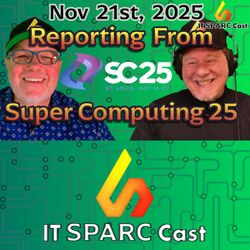
SuperComputing 25 Highlights: Cooling Wars, CXL Memory, & Hybrid AI Clouds
11:44||Season 2In this episode of IT SPARC Cast, Lou brings you a packed 8-minute walkthrough of the biggest themes and technologies from SuperComputing 25—the largest and busiest HPC show he’s ever attended.In this video, Lou covers:🔥 Cooling Wars: immersion cooling, PG25 liquid loops, cavitation risks, phase-change fluids, and long-term hardware reliability.🧠 CXL & Memory Expansion: shared GPU pools, multi-host memory fabrics, and how CXL can extend server life.☁️ Hybrid Cloud AI Platforms: two research-born vendors (including one FedRAMP-compliant) redefining HPC + cloud orchestration.⚡ Infrastructure Giants: the mind-blowing cooling and power equipment that will shape future enterprise data centers.And John reads out Listener Feedback regarding AlmaLinux as the successor to CentOS.If you want a concise, expert-level briefing from the SC25 show floor—this is the one to watch.What it on Youtube Here - https://youtu.be/Ve57fs7efFY00:00 – Intro01:08 – Greeting from Super Computing 25Lou sets the stage after returning from SuperComputing 25, describing the massive scale of the show, packed floors, and how SC25 has effectively replaced events like Interop and SuperComm.NEWS & TECH BREAKDOWN02:22 – The Major Theme: Cooling, Cooling, CoolingLou explains that cooling dominated the show, with two primary approaches emerging:1. Immersion Cooling • Full-system submersion in mineral oil or engineered fluids2. Active Liquid Cooling (PG25 Mix) • Issues explored: erosion, cavitation, biological growth, thermal cycling, solder fatigue3. Phase-Change Approaches • Solutions that vaporize at fixed temperatures (e.g., 55°C boiling point phase-change fluids)Why It Matters: Enterprise hardware longevity, reduced thermal stress, and predictable cooling efficiency.05:41 – CXL & Memory Expansion: The Future of Server Life ExtensionLou discusses a major standout category: CXL (Compute Express Link) technologies allowing: • Shared memory pools & GPUs across multiple hosts • Extending server life by adding external memory instead of replacing hardware • Switching architectures enabling dynamic assignment of terabytes of memory to GPUsEnterprise takeaway: “Do more with less” becomes practical—critical during recessionary or budget-tight periods.⸻07:55 – Hybrid Cloud AI PlatformsLou meets with two research-born companies offering advanced hybrid cloud and orchestration stacks: • One FedRAMP-compliant, built for U.S. federal and defense workloads • One European research derivative, designed for container-heavy hybrid environments without VMware relianceThese solutions focus on orchestration, HPC-to-cloud overflow, container scheduling, and distributed compute for AI.09:19 – Wrap UpJohn closes by encouraging viewers to watch the upcoming shorts and emphasizing how SC25 showcased the next generation of enterprise-class tech. He also covers Listener Feedback on our first short from SC25 regarding AlmaLinuxSocial LinksIT SPARC Cast@ITSPARCCast on Xhttps://www.linkedin.com/company/sparc-sales/ on LinkedInJohn Barger@john_Video on Xhttps://www.linkedin.com/in/johnbarger/ on LinkedInLou Schmidt@loudoggeek on Xhttps://www.linkedin.com/in/louis-schmidt-b102446/ on LinkedIn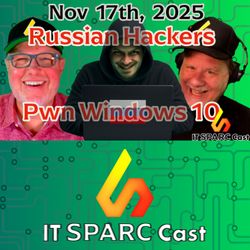
14. Grounded Planes, Open-Source Drama, Russian Stealth Malware, and Powerless Data Centers
20:11||Season 2, Ep. 14In this episode of IT SPARC Cast – News Bytes, John and Lou tackle a wild week in enterprise IT—from grounded aircraft disrupting hardware logistics, to open-source maintainers calling out Google, to sophisticated VM-based malware hiding inside Windows systems, to Santa Clara’s power grid collapsing under the weight of the AI boom.First, a tragic UPS MD-11 crash in Louisville forces both UPS and FedEx to ground all MD-11 aircraft—creating ripple effects for enterprise sparing strategies and next-day hardware replacement SLAs. John and Lou explain how events outside the IT bubble can quietly break your uptime guarantees.Then, the maintainers of FFmpeg publicly call out Google: either fund the project or stop flooding it with fuzz-generated bugs. The hosts explore the broader lesson: organizations relying on open source must contribute—code, money, or both.Next, the team walks through a jaw-dropping Hyper-V evasion technique, where Russian hackers spin up hidden Alpine Linux VMs to run malware undetected by EDR tools. Lou calls it “one of the most clever attack chains we’ve seen in years,” and John argues that Windows security must evolve to detect surprise VM creation.Finally, Santa Clara—Nvidia’s hometown—has data centers sitting empty because the city literally has no power left to give. With AI megaprojects like Project Stargate on the horizon, John and Lou warn that the grid crisis is about to become every CIO’s problem.Show Notes00:00 – IntroNEWS BYTES01:05 – UPS and FedEx Ground Planes After Louisville Crash • A UPS MD-11 crashes, triggering a fleetwide grounding of MD-11 cargo aircraft. • Immediate supply-chain impact for next-day server replacements and enterprise sparing. • John and Lou highlight why IT leaders must monitor “non-IT” news that affects logistics. • A reminder: SLA = logistics, and logistics depends on the real world.https://www.nbcnews.com/news/us-news/ups-grounds-md-11-fleet-type-plane-louisville-crash-sources-say-rcna242711 04:19 – FFmpeg to Google: Fund Us or Stop Sending Bugs • Google’s fuzzing system floods FFmpeg with nonstop bug reports. • Maintainers say the project is overwhelmed and demand Google contribute. • Discussion: the ethical and practical responsibility companies have to support open source.https://thenewstack.io/ffmpeg-to-google-fund-us-or-stop-sending-bugs 07:25 – Hackers Weaponize Windows Hyper-V to Hide Linux VM and Evade EDR Detection • Threat actor Curly Comrades uses Hyper-V to run hidden Alpine Linux VMs. • Malware (CurlyShell & CurlyCat) routes through host NAT, appearing as normal traffic. • Hard to detect: tiny VM footprint, few forensic artifacts, zero EDR visibility. • John: Windows Defender should alert when a new VM spins up—“Did you mean to do this?”https://thehackernews.com/2025/11/hackers-weaponize-windows-hyper-v-to.html 13:08 – Data Centers in Nvidia’s Hometown Stand Empty Awaiting Power • Two new Santa Clara data centers cannot turn on due to a power shortage. • Signals a coming crisis as AI mega-facilities exceed grid capacity. • Power costs and grid constraints may soon drive enterprise IT budgeting changes.https://finance.yahoo.com/news/data-centers-nvidia-hometown-stand-100009877.html 15:56 – Mail Bag & Wrap UpIT SPARC Cast@ITSPARCCast on Xhttps://www.linkedin.com/company/sparc-sales/ on LinkedInJohn Barger@john_Video on Xhttps://www.linkedin.com/in/johnbarger/ on LinkedInLou Schmidt@loudoggeek on Xhttps://www.linkedin.com/in/louis-schmidt-b102446/ on LinkedIn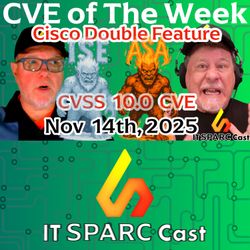
14. Cisco CVE Double Feature: ASA Firewall RCE + ISE Root Takeover (CVE-2025-20333, CVE-2025-20362, CVE-2025-20337)
11:40||Season 2, Ep. 14In this week’s IT SPARC Cast, John and Lou break down a Cisco security double feature—three critical vulnerabilities impacting Cisco ASA, Cisco Secure Firewall (FTD), and Cisco Identity Services Engine (ISE). These flaws include authentication bypass, chained remote code execution, and a CVSS 10.0 root-level compromise via an undocumented ISE API.We explain how CVE-2025-20333, CVE-2025-20362, and the newly revealed CVE-2025-20337 work, why federal agencies issued emergency patch directives, and what immediate mitigation steps enterprise defenders must take. If you manage Cisco firewalls or identity systems, this episode is mandatory listening.00:00 - Intro01:05 - CVEs of the Week – Cisco ASA & FTD (CVE-2025-20333 & CVE-2025-20362)• Two actively exploited Cisco firewall vulnerabilities enable authentication bypass and chained remote code execution.• Attackers linked to ArcaneDoor/Storm-1849 are using CVE-2025-20362 to bypass authentication, paired with CVE-2025-20333 for full RCE device takeover.• Compromised devices show unexpected reloads, disabled logs, and firmware persistence via ROMMON modification.• Over 50,000 ASA/FTD systems remain exposed, many still unpatched.• Emergency guidance from CISA and NCSC stresses immediate patching, disabling WebVPN/SSL, IP whitelisting, and checking for persistence or odd CLI behavior.• Lou and John emphasize the need for a multi-vendor firewall strategy to avoid single-vendor blast-radius failures.⸻05:00 - Cisco ISE – CVE-2025-20337 (Root-Level RCE via Undocumented API)• Amazon’s threat intelligence team discovered in-the-wild exploitation of an undocumented ISE API endpoint.• This CVSS 10.0 vulnerability allows deserialization attacks leading to unauthenticated root-level access.• Attackers deploy an advanced, stealthy web-shell (“IdentityAuditAction”) featuring:– In-memory execution– Java reflection thread injection– Custom DES-encrypted C2– No disk artifacts• Exploitation activity dates back to at least May and may be earlier.• Mitigation requires updating to patched ISE versions, segmenting management networks, monitoring unexpected listeners, and tightening inbound firewall policies.• John and Lou reiterate that identity remains the “universal attack surface,” and poor segmentation continues to amplify enterprise risk.⸻09:26 - Listener FeedbackA viewer asked whether the F5 BIG-IP source code leak affects only the management plane or the data plane.Answer: Both. Because the entire codebase was leaked, any subsystem could harbor latent zero-day attack surfaces—further stressing the importance of aggressive patching and hardened segmentation.⸻10:28 - Wrap UpWe appreciate every question, comment, and suggestion. Keep them coming.IT SPARC Cast@ITSPARCCast on Xhttps://www.linkedin.com/company/sparc-sales/ on LinkedInJohn Barger@john_Video on Xhttps://www.linkedin.com/in/johnbarger/ on LinkedInLou Schmidt@loudoggeek on Xhttps://www.linkedin.com/in/louis-schmidt-b102446/ on LinkedIn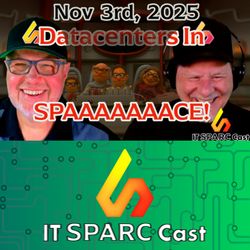
13. AI in Orbit, Microsoft’s Missteps, and the OpenAI Backdoor Nobody Saw Coming
18:17||Season 2, Ep. 13In this week’s IT SPARC Cast – News Bytes, John and Lou go galactic—covering AI data centers in orbit, Microsoft’s blunders, and a nasty new Windows backdoor exploiting OpenAI’s API.First, it’s “IT in SPAAAAAACE!” as Google unveils Project Suncatcher, an effort to launch radiation-hardened Tensor Processing Units (TPUs) into orbit for solar-powered, space-based AI compute. Then, SpaceX announces plans to build low-Earth-orbit data centers using its Starlink satellite infrastructure and Tesla’s upcoming AI chips—pushing the data center arms race off-planet.Next up in “Really, Microsoft?” — the latest Windows 11 bug means “Update and Shut Down” doesn’t actually shut down. It just reboots. But the real danger comes from the newly discovered SesameOp backdoor, which uses the OpenAI Assistants API as its command-and-control channel—making it nearly invisible to traditional security tools.Finally, Microsoft ends volume pricing discounts for enterprise customers, sparking frustration across IT departments already battling licensing complexity.Show Notes00:00 - IntroJohn and Lou open with a new segment: “IT in Space!” as data centers literally leave Earth’s surface.01:02 - Google’s Next Moonshot: Project Suncatcher • Google to launch Project Suncatcher—solar-powered AI compute nodes using Tensor Processing Units (TPUs) in orbit. • Partners with Planet Labs for radiation-hardened TPU testing. • Orbiting clusters could provide 8x more energy efficiency than Earth-based systems. • Challenges include cooling, radiation shielding, and debris avoidance.https://9to5google.com/2025/11/04/google-project-suncatcher/03:41 - SpaceX Plans Data Centers in Low-Earth Orbit • SpaceX confirms Starlink v3 satellites will support data center modules. • Tied to Tesla’s AI5 and upcoming AI6 chip platforms. • Starship will be used to deploy orbital compute clusters. • Laser interlinks and orbital energy capture could redefine distributed computing.https://x.com/dimazeniuk/status/1984613494629503484?s=61&t=vt5DZTzMzVaVQd0cNd8iuA06:55 - “Update and Shut Down” No Longer Restarts PC • Microsoft’s November 2025 preview patch fixes a long-standing issue: “Update and Shut Down” reboots instead of powering off. • Optional fix available under Windows 11 build 26200.7019. • Another headache in Windows’ long list of quality-of-life bugs.https://www.windowslatest.com/2025/11/02/update-and-shut-down-no-longer-restarts-pc-as-windows-11-25h2-patch-addresses-a-decades-old-bug/08:10 - SesameOp Backdoor Using OpenAI Assistants API • SesameOp discovered by Microsoft’s DART Team. • Uses OpenAI’s Assistants API as a stealthy command-and-control (C2) channel. • No patch yet—only firewall whitelisting and Defender rules recommended.https://thehackernews.com/2025/11/microsoft-detects-sesameop-backdoor.html13:53 - Microsoft Ends Volume Pricing • As of Nov 1, Microsoft has eliminated tiered volume discounts for Enterprise Agreements. • Large customers will now pay the same flat rate as smaller ones. • Could increase software spend by double digits at renewal.https://www.cio.com/article/4079004/microsoft-ends-volume-pricing-potentially-costing-companies-millions.html15:29 - Mail Bag & Wrap Uphttps://daily.jstor.org/when-the-push-button-was-new-people-were-freaked/IT SPARC Cast@ITSPARCCast on Xhttps://www.linkedin.com/company/sparc-sales/ on LinkedInJohn Barger@john_Video on Xhttps://www.linkedin.com/in/johnbarger/ on LinkedInLou Schmidt@loudoggeek on Xhttps://www.linkedin.com/in/louis-schmidt-b102446/ on LinkedIn